Electric Cars v Hydrogen Cars – Which Is The Better Choice?
Our chief aim at DriveElectric is helping motorists go green. So we’ve taken a look at hydrogen’s green credentials and viability as a real-world fuel source for personal vehicles.
One of the most common arguments posited against battery-powered electric vehicles (EVs), is that we should all be waiting for hydrogen power instead. Hydrogen-powered vehicles have actually been around for over 150 years. A chap named Etienne Lenoir – in 1860 – created the ‘Hippomobile’. The first example of a hydrogen powered vehicle. Considering the historic pedigree – why haven’t hydrogen vehicles (FCEVs) taken off?
How do hydrogen cars work?
Hydrogen pumps at refuelling stations dispense a liquified form of hydrogen into a pressurised tank within the vehicle. The tank then mixes the highly pressurised hydrogen with oxygen. It does this via a fuel cell – the backbone of hydrogen technology. The fuel cell is responsible for creating the electrochemical reaction that produces electricity. This electricity then powers the motors for the wheels. Hence their name: fuel cell electric vehicles (FCEVs). The only waste by-product of this reaction is water, which means zero tailpipe emissions.
Are Hydrogen Cars The Future?
We've listed the biggest pros and cons for hydrogen-powered vehicles below.
1) High Cost Per Mile
A full charge for an electric car is about £8 depending on the size of onboard battery. Whereas a full tank of hydrogen costs about £75 (based on £10-£15 per kilo). In real world terms, the RAC calculated a hydrogen car would cover 100km at a cost of £11.40. An electric counterpart would only cost £3 to cover the same distance.
With a per mile cost of nearly four times that of an electric vehicle, there aren’t many savings to be had at the pump – regardless of the fuel it’s dispensing.
Bottom line: in regards to fuel cost, running a hydrogen car is similar to an unleaded petrol vehicle.
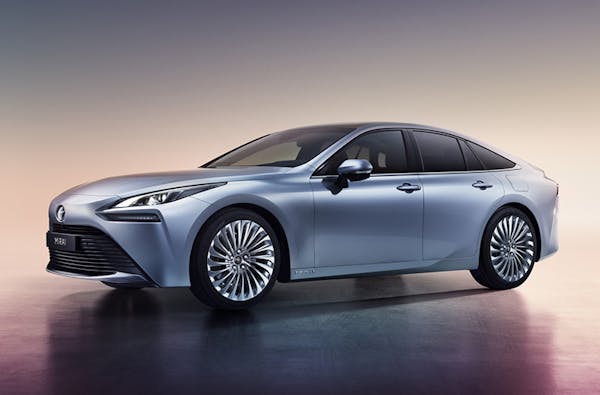
2) Vehicle Choice
The EV market is awash with electric cars and vans of all shapes, sizes and price points to suit a plethora of needs. Whether you’re a small business wanting to test out an electric van on a short term basis, or a family looking for the best deal on a family car – there’s an EV out there to suit.
If a hydrogen car is more your speed, then there’s only a couple of options. Well, two options to be exact: the Toyota Mirai or Hyundai Nexo. Both are well equipped, including all the fancy bells-and-whistles you’d expect from a modern car. They’re not bad looking cars either. The Mirai is a sleek saloon, whilst the Nexo is a familiar SUV ‘crossover’ style.
If you’re after exclusivity though, forget supercars, a hydrogen car is where the real rarity lies. Buy a Nexo and you’ll join a club of only 24 other members. The Mirai is common-as-muck in comparison, with 172 fellow owners on UK roads.
That exclusivity does come at a cost though. An entry level Toyota Mirai starts at just shy of £50,000, whilst the Hyundai Nexo is an eyewatering £66,000. The latter of which would buy the Tesla Model 3 Performance edition and leave £6,000 change. A few quid more and you’re in Porsche Taycan territory.
We know what we’d rather have…
Bottom line: The cheapest way to get into hydrogen motoring costs the same as a premium electric vehicle.
3) Lack of Infrastructure
EV charging stations are becoming increasingly common throughout the UK road network. Supermarkets, town centres and carparks are seeing charging points installed all the time. Even home chargers are becoming standard in many new-build homes.
However, hydrogen filling stations are few and far between. According to UK H2 Mobility, there’s currently only a handful of places in the whole of the UK that allow motorists to fill up with hydrogen from a pump. Four within the M25, one in Sheffield and a couple of options in Aberdeen. And that's it. And unlike electric cans, a hydrogen car can't be topped up at home.
An increase in hydrogen pump-numbers would take billions of pounds in investment and years to develop. Legislation is often driven by demand too, and as we’ll get onto later, there simply aren’t enough people going hydrogen over electric to incentivise the investment.
Bottom line: If you plan on driving outside of the M25, it’ll be incredibly difficult to refill the tank on your hydrogen car.
4) Re-Fuelling Speed
If you do manage to find a refuelling station, then refilling the hydrogen tank is a quicker process than charging an EV. You simply fill up like a traditional car at a filling station using the pump. It’s still slower than traditional petrol/diesel though – taking around 5 minutes to completely refill. With rapid chargers getting cars like the EV6 from 10-80% charge in 18 minutes, hydrogen isn’t the vast timesaver it can be touted as.
Bottom line: There’s only about a 13 minute difference between charging up an EV and refilling a tank of hydrogen.
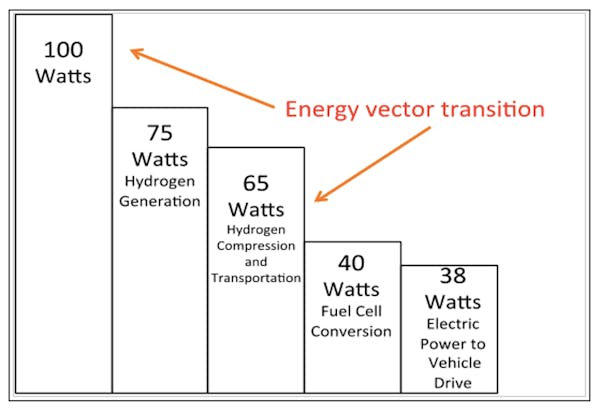
5) Inefficiency
Tom Baxter (Senior Lecturer in Chemical Engineering) explains it far better than us humble leasing experts ever could. He refers to ‘energy vector transition’ – essentially how much energy is lost from source to the target destination.
He uses 100 watts of energy as a starting example – whether that’s produced via a renewable source or otherwise, that energy must then be turned into hydrogen. One of the most popular processes for doing this, is electrolysis. Electrolysis is around 75% efficient, so already a quarter of our 100 watts has been lost.
The hydrogen is then compressed and chilled for transportation, before being offloaded into the filling station. This is around a 90% efficient process.
Then the end user steps in, and fills their car up with liquid hydrogen via the pumps. Inside the vehicle, the hydrogen is converted back into electricity at a rate of 60% efficiency. This electricity finally goes to the motors that power each wheel, at an efficiency rate of around 95%.
The finally tally: only 38% of the original energy actually hits the tarmac when using hydrogen power. Compare that to the far less convoluted route electricity takes to a battery powered EV and the result is night and day.
Bottom line: EVs are more than twice as efficient in utilising their energy. Hydrogen’s efficiency is simply constrained by the laws of science
6) Manufacturers Are Stepping Away
Of course, most of the aforementioned issues may be countered with: “just wait for hydrogen to become feasible, and then make the switch.” Unfortunately for die-hard hydrogen-ers (yep, definitely a real word), hydrogen may never become feasible.
OEMs decide whether hydrogen cars get made. After extensive research looking at the profitability and practicality of introducing hydrogen-powered cars on a mass scale, many manufacturers have drawn the same conclusion: it isn’t.
Volkswagen summarises their stance; “The conclusion is clear” said the company. “In the case of the passenger car, everything speaks in favour of the battery and practically nothing speaks in favour of hydrogen.”
Mercedes said much the same in 2017, stilting any hope of a hydrogen-powered luxury saloon. CEO Dieter Zetsche highlights the crux of the issue: “Battery costs are declining rapidly whereas hydrogen production remains very costly.”
Bottom line: Most manufacturers simply aren’t investing in hydrogen technology. Thus, it’ll remain costly, ineffective and unviable for large scale consumer vehicles.
The Conclusion: EV or FCEV?
Hydrogen cars are likely to become even more of a rarity on UK roads than they currently are. Lack of investment, interest and infrastructure is likely to prove too much of a burden to bear for H2-power. As the ICE ban comes into effect circa 2035, there will likely be only one option: to DriveElectric. Don’t wait until then though!
Our electric car lease special offers
Cupra Born 169kW e-Boost V1 59kWh 5dr Auto
- £2,098.85 Initial rental (ex. VAT)
- £2,518.62 Initial rental (inc. VAT)
- 48 Month term
- 5000 Annual mileage
- Subject to status and conditions + arrangement fee
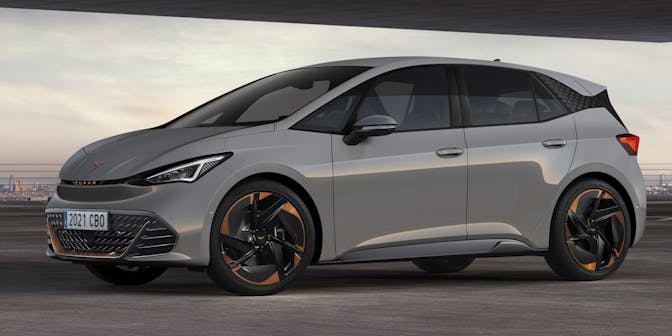
Ford Puma Gen-E 123kW Select 43kWh 5dr Auto
- £2,147.79 Initial rental (ex. VAT)
- £2,577.34 Initial rental (inc. VAT)
- 48 Month term
- 5000 Annual mileage
- Subject to status and conditions + arrangement fee
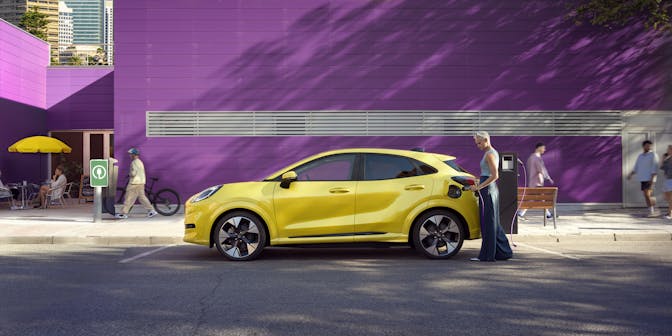
Volkswagen ID.5 210kW Match Pro 77kWh 5dr Auto
- £2,722.90 Initial rental (ex. VAT)
- £3,267.48 Initial rental (inc. VAT)
- 48 Month term
- 5000 Annual mileage
- Subject to status and conditions + arrangement fee
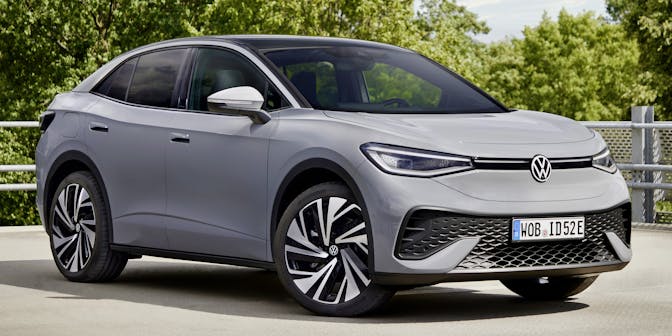
More EV guides
Understanding Vehicle Excise Duty (VED) or "Road Tax" for EVs
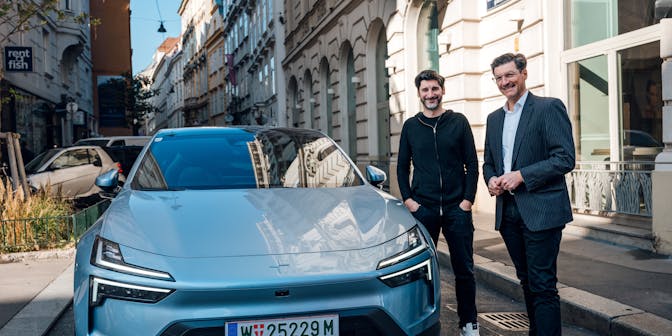
How to save money on a new car with Salary Sacrifice
How is salary sacrifice calculated?
